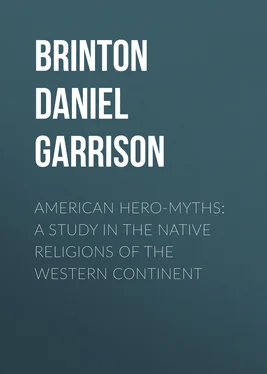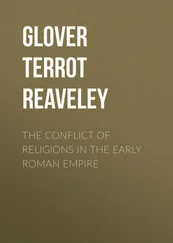Daniel Brinton - American Hero-Myths - A Study in the Native Religions of the Western Continent
Здесь есть возможность читать онлайн «Daniel Brinton - American Hero-Myths - A Study in the Native Religions of the Western Continent» — ознакомительный отрывок электронной книги совершенно бесплатно, а после прочтения отрывка купить полную версию. В некоторых случаях можно слушать аудио, скачать через торрент в формате fb2 и присутствует краткое содержание. Жанр: foreign_prose, История, Мифы. Легенды. Эпос, foreign_edu, foreign_antique, на английском языке. Описание произведения, (предисловие) а так же отзывы посетителей доступны на портале библиотеки ЛибКат.
- Название:American Hero-Myths: A Study in the Native Religions of the Western Continent
- Автор:
- Жанр:
- Год:неизвестен
- ISBN:нет данных
- Рейтинг книги:4 / 5. Голосов: 1
-
Избранное:Добавить в избранное
- Отзывы:
-
Ваша оценка:
- 80
- 1
- 2
- 3
- 4
- 5
American Hero-Myths: A Study in the Native Religions of the Western Continent: краткое содержание, описание и аннотация
Предлагаем к чтению аннотацию, описание, краткое содержание или предисловие (зависит от того, что написал сам автор книги «American Hero-Myths: A Study in the Native Religions of the Western Continent»). Если вы не нашли необходимую информацию о книге — напишите в комментариях, мы постараемся отыскать её.
American Hero-Myths: A Study in the Native Religions of the Western Continent — читать онлайн ознакомительный отрывок
Ниже представлен текст книги, разбитый по страницам. Система сохранения места последней прочитанной страницы, позволяет с удобством читать онлайн бесплатно книгу «American Hero-Myths: A Study in the Native Religions of the Western Continent», без необходимости каждый раз заново искать на чём Вы остановились. Поставьте закладку, и сможете в любой момент перейти на страницу, на которой закончили чтение.
Интервал:
Закладка:
The birthplace of this culture hero was somewhere far to the eastward of Greece, somewhere in "the purple land" (Phoenicia); his mother was "the far gleaming one" (Telephassa); he was one of four children, and his sister was Europe, the Dawn, who was seized and carried westward by Zeus, in the shape of a white bull. Cadmus seeks to recover her, and sets out, following the westward course of the sun. "There can be no rest until the lost one is found again. The sun must journey westward until he sees again the beautiful tints which greeted his eyes in the morning." [6] [ Footnote 6 : Sir George W. Cox, Ibid. , p. 76.] [ Footnote 7 : See Dr. C.P. Tiele, History of the Egyptian Religion , pp. 93, 95, 99, et al.] [ Footnote 8 : "Τον εμον Χιτωνα ουδεις απεχαλυφεν ον εγω χαρπον ετεχαν, ηλιος εγενετο." (Greek: Ton emon chitona oudeis apechaluphen on ego charpon etechan, aelios egeneto.)]" Proclus, quoted by Tiele, ubi suprá, p. 204, note.]
Therefore Cadmus leaves the purple land to pursue his quest. It is one of toil and struggle. He has to fight the dragon offspring of Ares and the bands of armed men who spring from the dragon's teeth which were sown, that is, the clouds and gloom of the overcast sky. He conquers, and is rewarded, but does not recover his sister.
When we find that the name Cadmus is simply the Semitic word kedem , the east, and notice all this mythical entourage, we see that this legend is but a lightly veiled account of the local source and progress of the light of day, and of the advantages men derive from it. Cadmus brings the letters of the alphabet from the east to Greece, for the same reason that in ancient Maya myth Itzamna, "son of the mother of the morning," brought the hieroglyphs of the Maya script also from the east to Yucatan–because both represent the light by which we see and learn.
Egyptian mythology offers quite as many analogies to support this interpretation of American myths as do the Aryan god-stories.
The heavenly light impregnates the virgin from whom is born the sun-god, whose life is a long contest with his twin brother. The latter wins, but his victory is transient, for the light, though conquered and banished by the darkness, cannot be slain, and is sure to return with the dawn, to the great joy of the sons of men. This story the Egyptians delighted to repeat under numberless disguises. The groundwork and meaning are the same, whether the actors are Osiris, Isis and Set, Ptah, Hapi and the Virgin Cow, or the many other actors of this drama. There, too, among a brown race of men, the light-god was deemed to be not of their own hue, but "light colored, white or yellow," of comely countenance, bright eyes and golden hair. Again, he is the one who invented the calendar, taught the arts, established the rituals, revealed the medical virtues of plants, recommended peace, and again was identified as one of the brothers of the cardinal points. [7] [ Footnote 7 : See Dr. C.P. Tiele, History of the Egyptian Religion , pp. 93, 95, 99, et al.] [ Footnote 8 : "Τον εμον Χιτωνα ουδεις απεχαλυφεν ον εγω χαρπον ετεχαν, ηλιος εγενετο." (Greek: Ton emon chitona oudeis apechaluphen on ego charpon etechan, aelios egeneto.)]" Proclus, quoted by Tiele, ubi suprá, p. 204, note.]
The story of the virgin-mother points, in America as it did in the old world, to the notion of the dawn bringing forth the sun. It was one of the commonest myths in both continents, and in a period of human thought when miracles were supposed to be part of the order of things had in it nothing difficult of credence. The Peruvians, for instance, had large establishments where were kept in rigid seclusion the "virgins of the sun." Did one of these violate her vow of chastity, she and her fellow criminal were at once put to death; but did she claim that the child she bore was of divine parentage, and the contrary could not be shown, then she was feted as a queen, and the product of her womb was classed among princes, as a son of the sun. So, in the inscription at Thebes, in the temple of the virgin goddess Mat, we read where she says of herself: "My garment no man has lifted up; the fruit that I have borne was begotten of the sun." [8] [ Footnote 8 : "Τον εμον Χιτωνα ουδεις απεχαλυφεν ον εγω χαρπον ετεχαν, ηλιος εγενετο." (Greek: Ton emon chitona oudeis apechaluphen on ego charpon etechan, aelios egeneto.)]" Proclus, quoted by Tiele, ubi suprá, p. 204, note.]
I do not venture too much in saying that it were easy to parallel every event in these American hero-myths, every phase of character of the personages they represent, with others drawn from Aryan and Egyptian legends long familiar to students, and which now are fully recognized as having in them nothing of the substance of history, but as pure creations of the religious imagination working on the processes of nature brought into relation to the hopes and fears of men.
If this is so, is it not time that we dismiss, once for all, these American myths from the domain of historical traditions? Why should we try to make a king of Itzamna, an enlightened ruler of Quetzalcoatl, a cultured nation of the Toltecs, when the proof is of the strongest, that every one of these is an absolutely baseless fiction of mythology? Let it be understood, hereafter, that whoever uses these names in an historical sense betrays an ignorance of the subject he handles, which, were it in the better known field of Aryan or Egyptian lore, would at once convict him of not meriting the name of scholar.
In European history the day has passed when it was allowable to construct primitive chronicles out of fairy tales and nature myths. The science of comparative mythology has assigned to these venerable stories a different, though not less noble, interpretation. How much longer must we wait to see the same canons of criticism applied to the products of the religious fancy of the red race?
Furthermore, if the myths of the American nations are shown to be capable of a consistent interpretation by the principles of comparative mythology, let it be recognized that they are neither to be discarded because they resemble some familiar to their European conquerors, nor does that similarity mean that they are historically derived, the one from the other. Each is an independent growth, but as each is the reflex in a common psychical nature of the same phenomena, the same forms of expression were adopted to convey them.
[ Footnote 1: I suppose I am not going too far in saying "all agree;" for I think that the latest study of this subject, by Gustav Roskoff, disposes of Sir John Lubbock's doubts, as well as the crude statements of the author of Kraft und Stoff , and such like compilations. Gustav Roskoff, Das Religionswesen der Rohesten Naturvölker , Leipzig, 1880.]
[ Footnote 2: J. Hammond Trumbull, On the Composition of Indian Geographical Names , p. 3 (Hartford, 1870).]
[ Footnote 3: "El ser existente de hombre, que es el modo de estar el primer ser que es la essentia que en Dios y los Angeles y el hombre es modo personal." Diego Gonzalez Holguin, Vocabvlario de la Lengva Qqichua, o del Inca; sub voce, Cay . (Ciudad de los Reyes, 1608.)]
[ Footnote 4: Franco, Noticia de los Indios Guaymies y de sus Costumbres , p. 20, in Pinart, Coleccion de Linguistica y Etnografia Americana . Tom. iv.]
[ Footnote 5: Sir George W. Cox, An Introduction to the Science of Comparative Mythology and Folk-Lore , p. 17.]
[ Footnote 6: Sir George W. Cox, Ibid. , p. 76.]
[ Footnote 7: See Dr. C.P. Tiele, History of the Egyptian Religion , pp. 93, 95, 99, et al.]
[ Footnote 8: "Τον εμον Χιτωνα ουδεις απεχαλυφεν ον εγω χαρπον ετεχαν, ηλιος εγενετο." (Greek: Ton emon chitona oudeis apechaluphen on ego charpon etechan, aelios egeneto.)]" Proclus, quoted by Tiele, ubi suprá, p. 204, note.]
Читать дальшеИнтервал:
Закладка:
Похожие книги на «American Hero-Myths: A Study in the Native Religions of the Western Continent»
Представляем Вашему вниманию похожие книги на «American Hero-Myths: A Study in the Native Religions of the Western Continent» списком для выбора. Мы отобрали схожую по названию и смыслу литературу в надежде предоставить читателям больше вариантов отыскать новые, интересные, ещё непрочитанные произведения.
Обсуждение, отзывы о книге «American Hero-Myths: A Study in the Native Religions of the Western Continent» и просто собственные мнения читателей. Оставьте ваши комментарии, напишите, что Вы думаете о произведении, его смысле или главных героях. Укажите что конкретно понравилось, а что нет, и почему Вы так считаете.







![Hubert Bancroft - The Native Races [of the Pacific states], Volume 5, Primitive History](/books/749157/hubert-bancroft-the-native-races-of-the-pacific-s-thumb.webp)



![Hubert Bancroft - The Native Races [of the Pacific states], Volume 1, Wild Tribes](/books/750126/hubert-bancroft-the-native-races-of-the-pacific-s-thumb.webp)
